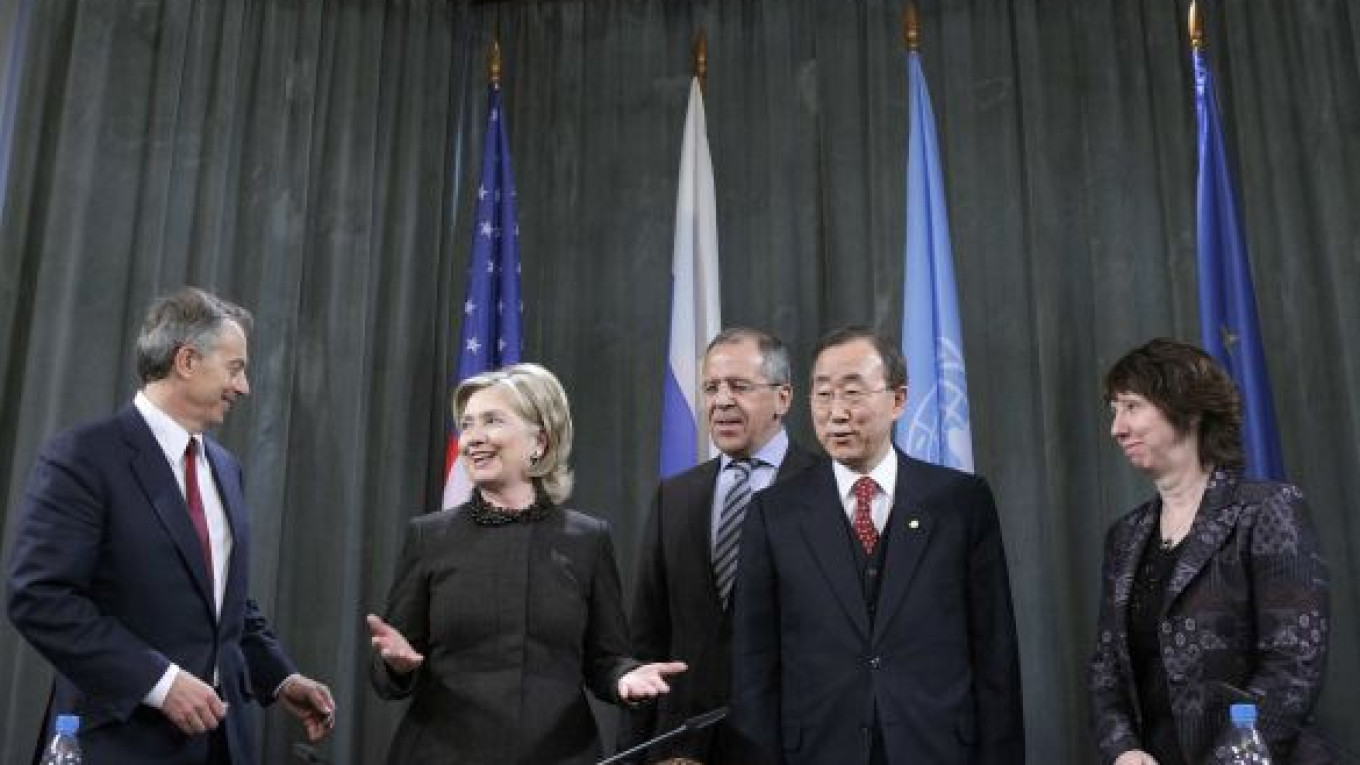Prime Minister Vladimir Putin demanded that the U.S. administration lower hurdles to Russian investment and offered U.S. Secretary of State Hillary Clinton a list of trade complaints during a meeting Friday.
Putin told Clinton in public comments before the talks that trade between the two countries last year collapsed from $36 billion to $16 billion because of the global recession.
"This is a very low level and far from the possibilities," Putin said, according to a transcript posted on his web site.
He complained that five Russian companies were subject to sanctions initiated by the State Department and that Cold War-era trade restrictions remained in place.
"Until now, the Jackson-Vanik Amendment is still in place," he said.
The restrictions, which prevent Russia from obtaining “normal trade relations” status, have been a bone of contention in Moscow's cumbersome negotiations to join the World Trade Organization.
Putin raised WTO membership next with Clinton, saying talks were going in circles. "We have been negotiating for 17 years now. Just three questions remain. And we keep running around that triangle," he said.
The prime minister also said Russian firms investing in the United States needed more support from Washington, and he singled out Norilsk Nickel and Severstal as examples. "They need signals that they are welcome," he said, adding that this was also true for U.S. companies investing in Russia, like General Electric and Boeing.
The United States ranks eighth in terms of accumulated investment in the country, Putin said, adding that he wanted the figure to increase.
Clinton told Putin that in talks with President Dmitry Medvedev earlier Friday she had discussed the possibility for greater cooperation between Russian and U.S. technology companies.
Clinton called for reducing trade barriers and reiterated U.S. support for Moscow's WTO accession. She also discussed a potential Russian bid for a multibillion-dollar U.S. aerial-refueling fleet.
After the talks, Putin's deputy chief of staff said the prime minister thought that the much-discussed "reset" of mutual ties had already improved the atmosphere but not yet the substance.
"Now is the time for decisive change in the substantial part of our bilateral relations," Yury Ushakov told reporters, Interfax reported.
Ushakov also said Putin told Clinton that Moscow's WTO membership depends only on the United States. "He said that if there was political will in Washington, the problem could be solved," Ushakov said.
Moscow's WTO talks have been overshadowed by a brawl with Washington over U.S. poultry.
Russia, once the largest importer of U.S. chicken, barred the meat as of Jan. 1 after slashing the allowable amount of chlorine that producers can use as a disinfectant.
Russia's food safety watchdog said Friday that the country would start importing Thai poultry as an alternative, Bloomberg reported.
On a more positive note, the government said it might lift import duties on foreign-made passenger jets, including those produced by Airbus and Boeing, when a customs union with Belarus and Kazakhstan begins to function on July 1, Vedomosti reported Friday.
Clinton, who was in Moscow for negotiations in the Middle East Quartet under the auspices of the United Nations, was originally not expected to meet with Putin because he was traveling. The talks in Putin's Novo-Ogaryovo residence were later tacked to the end of her schedule, giving the impression that Putin had left it unclear whether he would receive her. It was their first official contact since Clinton became secretary of state last year.
During talks with Medvedev and Foreign Minister Sergei Lavrov, Clinton failed to reach any breakthrough on the two most salient bilateral issues, negotiations over a successor to the Strategic Arms Reduction Treaty and U.S. efforts to impose sanctions against Iran.
Clinton said Geneva-based treaty negotiations were "nearly finished" and that both sides hoped to sign the new treaty early next month. "We hope to have a signing ceremony … in early April," she said in an interview with Bloomberg TV posted on the State Department's web site.
Clinton and Lavrov refused to say Friday where the signing would take place, and Ushakov merely said it would take place in Europe.
Kommersant reported that Moscow had pushed for Kiev as a symbol for the new Ukrainian government's pro-Russian course but Washington opposed the idea and the signing would take place in Prague.
On Iran, Putin told Clinton that sanctions were possible but warned that they might not solve the problem and were maybe even counterproductive, Ushakov said.
Putin managed to irritate Clinton on Thursday when he announced that Russia would launch Iran's Bushehr nuclear reactor this summer.
A Message from The Moscow Times:
Dear readers,
We are facing unprecedented challenges. Russia's Prosecutor General's Office has designated The Moscow Times as an "undesirable" organization, criminalizing our work and putting our staff at risk of prosecution. This follows our earlier unjust labeling as a "foreign agent."
These actions are direct attempts to silence independent journalism in Russia. The authorities claim our work "discredits the decisions of the Russian leadership." We see things differently: we strive to provide accurate, unbiased reporting on Russia.
We, the journalists of The Moscow Times, refuse to be silenced. But to continue our work, we need your help.
Your support, no matter how small, makes a world of difference. If you can, please support us monthly starting from just $2. It's quick to set up, and every contribution makes a significant impact.
By supporting The Moscow Times, you're defending open, independent journalism in the face of repression. Thank you for standing with us.
Remind me later.


